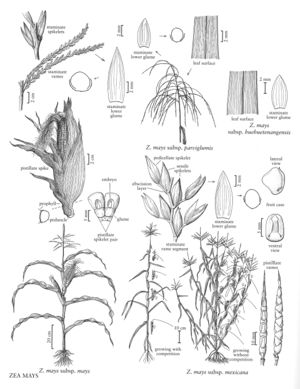Difference between revisions of "Zea mays subsp. mays"
FNA>Volume Importer |
FNA>Volume Importer |
||
| Line 36: | Line 36: | ||
|publication year= | |publication year= | ||
|special status= | |special status= | ||
| − | |source xml=https://jpend@bitbucket.org/aafc-mbb/fna-data-curation.git/src/ | + | |source xml=https://jpend@bitbucket.org/aafc-mbb/fna-data-curation.git/src/f6b125a955440c0872999024f038d74684f65921/coarse_grained_fna_xml/V25/V25_1667.xml |
|subfamily=Poaceae subfam. Panicoideae | |subfamily=Poaceae subfam. Panicoideae | ||
|tribe=Poaceae tribe Andropogoneae | |tribe=Poaceae tribe Andropogoneae | ||
Revision as of 19:24, 24 September 2019
Culms (1)2-4(6) m tall, (1)2-5 cm thick. Blades 50-90 cm long, 3-12 cm wide. Pistillate inflorescences spikes, 15-25(40) cm long, 2-5(10) cm thick, cylindrical, tightly and permanently enclosed in several to many leaf sheaths and a large prophyll, with 8-24 or more rows of paired spikelets on a thickened, strongly vascularized, tough rachis (cob), not disarticulating at maturity; fruitcases not developed, rachis internodes fused into the extra-vascular cylinder, glumes reduced, shallow. Caryopses 60-1000+, exposed and naked. Staminate panicles with a polystichous central axis and non-disarticulating branches; central axes usually much denser and thicker than the usually distichous lateral branches, these lacking abscission layers. 2n = 20.
Discussion
Zea mays subsp. mays is the familiar domesticated corn (or maize), from which around 400 indigenous races and many different kinds of cultivars have been developed. It is an obligate cultigen, unable to persist outside of cultivation because the caryopses are permanently attached to the rachis and enclosed by the subtending leaf sheaths. Supersweet cultivars have a double recessive gene that delays the conversion of sugar to starch; flint corns have unusually hard endosperm; and waxy cultivars have endosperm with an unusually high level of proteins and oils. Popcorns have a core of soft, relatively moist endosperm surrounded by hard endosperm. The grains "pop" when heat causes the moisture of the inner endosperm to vaporize.
Selected References
None.
